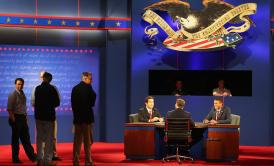The conventional wisdom among political campaign experts has long been that debates don’t really matter that much in the long run. After this year, that’s likely to change. “Never have candidate debates played as important a role, from the start of the Republican primaries through the general election, as they have in this election,” writes the Washington Post’s Dan Balz. It’s little wonder then that expectations are high for the 90-minute face-off between Mitt Romney and President Obama in Boca Raton, Fla., where CBS’s Bob Schieffer will ask questions relating to foreign policy.
At the start of the election campaign, it seemed ridiculous to suggest that the third debate on foreign policy was going to be so critical to the race. “And yet, here we are,” notes the Washington Post’s Chriz Cillizza. Beyond the tight race evident in recent polls, the attack in Benghazi, Libya, has suddenly thrust a foreign-policy issue into the spotlight. Heading into the debate, expectations are clearly higher for Obama. It’s not just that it’s easier for a sitting commander in chief to have a command of foreign policy intricacies and details, Romney has also “let his inexperience on the foreign stage show time and again,” notes the National Journal’s Beth Reinhard.
On Sunday, Romney’s supporters tried to begin shaping the narrative by going on the Sunday talk shows and arguing the president has weakened national security during his tenure, reports the Associated Press. Ohio Sen. Rob Portman characterized the news that Iran and the United States have agreed to direct negotiations in principle as “another example of a national security leak from the White House.”
The report in the New York Times guarantees that Iran will get lots of time alongside Libya on Monday. BuzzFeed talks to a Repulbican operative who said the story “should be a gift for Mitt” because “it’s an embarrassing reminder of how little progress they’ve made on Iran.” Still, it’s unclear whether Schiefer will allow the issue to dominate the conversation. The veteran anchor has said he will spend the most time on the Arab uprisings, their aftermath and how the terrorism threat has changed since Sept. 11, writes the New York Times’ David Sanger. Other issues likely to come up include cyberwar, Afghanistan, and China.
